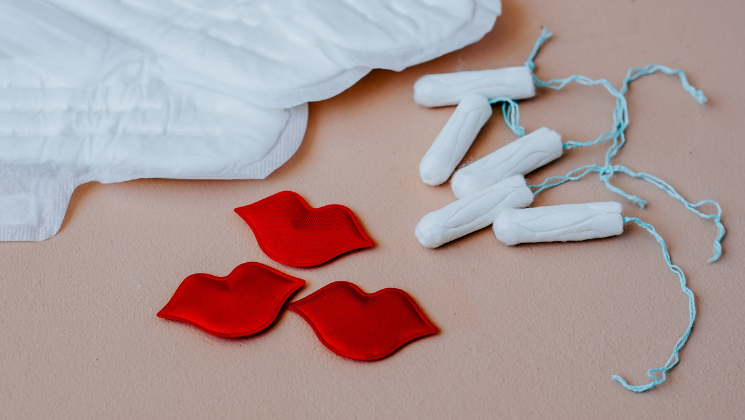The stigma that has developed around periods, a bodily function that is nothing less than a natural process, is outstanding… and dangerous. Help us fight the stigma by educating yourself on period poverty and how it impacts the academic and working life of those who bleed.

There is a perception that if you are on your period, you are unable to move from the couch or you need to take a day off from work or school.
For some, this is because of the cramps or side effects that come with our ‘time of the month’. However, for others, these acts are because of the shame of period poverty – of not having sanitary products and the weird shame that still sometimes comes with sharing that you are on your period with colleagues, friends or teachers.
The stigma that has developed around periods, a bodily function that is nothing less than a natural process, is outstanding… and dangerous.
Periods and… Poverty
Many people across the UK are faced with limitations when accessing menstrual hygiene facilities, period products and ways to manage associated wastage. There is a taboo mentality surrounding periods which fuels the shame and awkwardness some people feel when in need of asking for sanitary products or having to publicly deal with leaks or explaining their ‘face’ or ‘mood’.
The shame surrounding periods is so impactful that some are still unaware that period poverty exists, or if they are aware they don’t realise just how many people are affected by it. This unspoken, back-turned attitude prevents people from reaching out for help when needed, from being aware of the support available and causes delays to any systematic changes from taking place.

It can lead to taking time off school or work and even re-using period products or substitute items (which can lead to severe infections). Without access to vital hygiene tools, there is a significant risk to the health of those affected, their education and mental well-being.
There have been steps forward to tackle period poverty. Scotland has devised a scheme to make all sanitary products free, which came into effect early this year and young people in education have access to free sanitary products in their schools across the UK. These changes are tackling period poverty and allow those who bleed to harness their ambition and dreams – to live their lives without the worry of improper sanitary care. All that is left now is for the UK, and the rest of the world, to follow Scotland’s example, and end period poverty for good.
Periods and… Our careers
The period poverty charity Bloody Good Period conducted a study in 2021 which focussed on the workplace experiences of people who menstruate. Their findings demonstrated that 33% of their participants felt it was unprofessional to mention their menstrual health in front of their employer and senior staff members. There’s the dangerous impact of stigma once again.
What effect does this have on people’s work life? Periods impact those who bleed individually. For some, their job performance may not be impacted while others might be in excruciating pain, or feel nauseous or dizzy. In these instances, their job performance could be affected. Employees might need to take sick days because of period poverty or the shame and humiliation that period stigma creates. However, taking sick days every month due to menstruation could seriously impact your job performance and advancements in your career.

Perhaps there would be disciplinary actions, you might not be considered for promotion or pay rises due to your employer’s potential belief that you’re not committed enough, because you’re off sick… every month. The study also found that some employees felt unable to ask for sick pay when on their period and instead would use their annual leave days when they needed to stay at home due to menstruating.
People should not be using annual leave for a natural process, one that is decidedly out of their control. In the post COVID-19 working world, employers where possible could be introducing a policy that sees those who are on their period able to work from home, a simple and effective solution to get the job done, even out workloads and avoid sick days. A simple and effective solution to help women progress in their careers. Understandably working from home is not a possibility all employers can offer, but they all can take these steps to destigmatise periods.
Other respondents said they had experienced mockery from their superiors when they mentioned being in pain. The issues of mockery and not being able to openly discuss menstruation are direct results of period stigma and have the potential to also impact a person’s work performance and absence rate. Openly discussing these personal experiences could remove an unnecessary barrier for employees who menstruate, by allowing them their right to rest when experiencing pain and sickness and to be shown respect by other employees.
Periods and… Our education
It’s an unfortunate truth that young people are often the most vulnerable to believing social myths and adopting stigmatising beliefs. For a pre-teenager or teenager, going to school can present a range of worries. An organisation called Plan International UK found that 82% of period-having students between the ages of 12 and 18 feel they need to conceal their period products when at school, and 72% of the participants were embarrassed by merely talking about period products.
Additionally, in an interview with the Independent, Chella Quint, a leading expert on menstruation literacy, revealed that many students had experienced not being able to access the school toilets during their lessons.
The effects of period-poverty (previously noted) also impact an individual’s education. Many young people feel the need to skip school or take sick days due to feeling unwell and experiencing pain while bleeding; over 130,000 students in the UK are at risk of falling 147 days behind their peers due to taking sick days or skipping school because of their period. The added social challenges, shame and isolation presented by period stigma creates an unnecessary pressure on students to avoid school on a monthly basis.

Tackling Period Stigma
The only way we are going to tackle the stigma surrounding periods is to educate ourselves and society and talk about them openly.
Knowledge is power – the more we know and learn about periods, the more we can work towards dismantling the stigma. By knowing how periods work and how they affect us, it becomes easier to notice the derogatory views around us and we can be equipped with facts to debunk any myths.
If you’re bleeding, shout about it and don’t let it hold you back!
Check out these useful resources for self-education on all things periods:
Plan International UK: Let’s Talk. Period
- Lunette blog
- Hey Girls
- Bloody Good Period
- Binti Period
- @beperiodpositive on Instagram
- @menstrualhealthproject on Instagram
